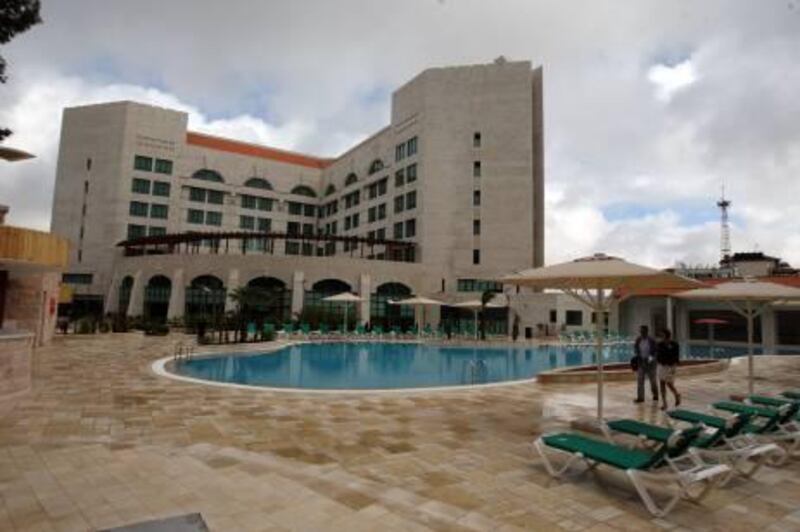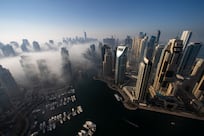RAMALLAH // With plush suites and an Italian chef, Ramallah's first luxury hotel opened yesterday, bolstered by a Palestinian economy prospering despite a seemingly intractable conflict with Israel that threatens to undermine it.
The five-star, US$42.6 million (Dh155.89m) Mövenpick Hotel Ramallah towers over this hilly West Bank city, a glinting symbol of progress for the governing Palestinian Authority and its hope to create an autonomous Palestinian state.
Its management hopes to capitalise on the city's status as a seat of government and attract visiting dignitaries and businessmen.
The business of government just might be the right recipe to bring them in. Ramallah, unlike neighbouring West Bank cities, boasts none of the biblically significant sites that still manage to attract tourists during the worst of times. Rather, the city has become what Washington, DC, is to the United States - a place that sets itself because of its political relevance.
To lure those of the Palestinian "Beltway", the 171-room hotel is arrayed with ultra-modern facilities that include a massive outdoor swimming pool as well as trendy bars and restaurants that serve cigars and pricey international cuisine.
For high-profile profile guests, a "VIP" lounge with exclusive underground parking and conference facilities was built on the basement level. Should they stay, they can opt for spacious presidential suites outfitted with designer fashions and state-of-the-art security systems.
"There are a lot of good local hotels in Ramallah, but they don't have the standards that we abide by," said Katreena Khalil, the hotel's communication manager.
Government employees, lobbyists, supplicants and non-governmental organisations may bring profits in times of peace, but Ramallah's combustible politics also risk low occupancy rates and returns on investment if the decades-old Israel-Palestinian conflict heats up again.
Employees at the hotel still recall when, not so long ago, Israeli tanks rumbled along the city's winding boulevards - a memory that still sends shudders down the spines of even the conflict's most calloused observers. Construction on the six-storey hotel itself was delayed for the better part of a decade as a result of the second intifada. It only resumed a few years ago, when Mövenpick Hotels & Resorts decided it was safe enough to open its doors.
Yet, even if the current round of peace talks between Israel and the Palestinians fails - a scenario that some fear may result in renewed fighting - Mrs Khalil was confident.
"We don't think about that at all," she said of the negotiations. "We offer our services to politicians, but we don't do politics."
What the hotel does do - in addition to gourmet Italian food served by an Italian chef - is provide local jobs, said Mrs Khalil.
Except for six expatriate employees, including a French baker, the other 250 positions are filled by Palestinians.
She added that the hotel would play an important part of the area's social fabric by hosting weddings, a popular venue for wealthy families in the Arab world. The hotel's event planner was inundated with requests, she said.
Neighbouring businessmen were also hopeful of the hotel's positive knock-on effect.
Tarek Hijazi, the owner of Calista, a Turkish clothing store, said he expected those attending conferences at the hotel to buy his suits and business attire.
But Mr Hijazi, who must navigate cumbersome Israeli checkpoints as he makes his daily commute from Jerusalem, expressed concern about the stability of the Palestinian economy.
"I wouldn't be able to run my business if the checkpoints were like they were five years ago," he said. "If they were, that would be bad for all of us."






